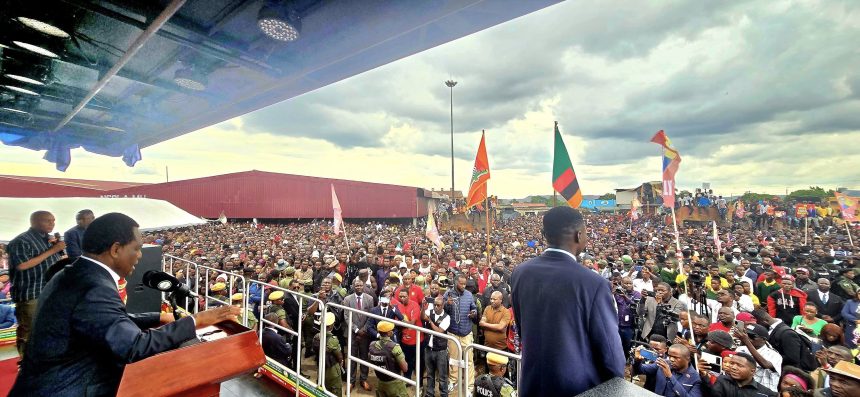By Brian Matambo – Lusaka, Zambia | 8 November 2025
The latest edition of The People’s Forum on Emmanuel Mwamba Verified captured a restless and angry national mood after President Hakainde Hichilema was booed and pelted with stones in Chingola. What began as an attempt by the Head of State to comfort traders who lost goods in the recent Chiwempala Market fire ended as a brutal reminder that public patience has run out.
On the show, Ambassador Mwamba read the official police report: riots and arson at 14:50 hours, a burnt police Land Cruiser, destroyed tents and toilets, and two young men in custody. He clarified that there were no bullets fired at the president’s podium, only stones hammering against the temporary roofing. But what followed on the phone lines and in the comment section was more explosive than the stones themselves.
Callers from within Zambia and abroad dissected the Copperbelt turmoil as a symptom of something far deeper, anger at broken promises, suppression of freedoms, and selective empathy. Veteran journalist Thomas Allan Zulu noted that “when you silence citizens with cyber laws and fear, their frustration brews underground until it bursts out.” Others echoed him, saying Chingola’s discontent was born from mine politics and deceitful communication. They cited the opaque handover of KCM back to Vedanta, the sidelining of local small-scale miners, and the perception that government cronies had captured copper waste dumps once meant for community empowerment.
Several contributors said the President’s handlers were feeding him propaganda, packaging hardship as progress. “He’s being told Copperbelt is booming when people can’t even afford breakfast,” one caller complained. Others blamed the system for ignoring security warnings and parading Hichilema through a volatile region without reading the mood. “That was reckless,” said a listener from Lusaka. “You don’t walk a man into a storm and call it leadership.”
The show’s tone turned even more pointed when callers drew parallels between Hichilema’s current humiliation and what he allowed to happen to his predecessor. “During Edgar Lungu’s farewell at the Heroes Stadium inauguration, Hakainde stood by as the crowd booed and mocked a former president. He smiled through it,” one caller recalled. “He could have shown leadership by stopping it. Today he has tasted the same disrespect.” The panel agreed that this moment carried poetic justice, a mirror held to arrogance.
Others accused Hichilema of playing dangerous regional politics. His recent trip to Tanzania, where he applauded a president elected through a bloodstained and disputed vote, left many Zambians unsettled. “He praised an election that jailed opponents and killed protesters,” one caller fumed. “Maybe he’s learning that model for 2026.”
A chilling thread ran through the later calls that elements within the system may now be orchestrating public disorder to justify a clampdown. Anonymous callers warned that Zambia could be walked into a state of emergency that freezes the constitution and delays the 2026 general elections, buying time for constitutional manipulation. “If we’re not alert, this is how democracy dies, manufactured chaos, followed by control,” one listener warned.
Others pointed to the hypocrisy of a president announcing ten million kwacha handouts to traders while farmers still wait months for payment. “He throws figures like confetti,” said one caller from the United Kingdom. “Where is he getting this money when farmers who feed the country are broke?” The comment resonated widely across social media, where many accused the president of performing generosity instead of governing.
Despite the anger, most listeners condemned the violence in Chingola while holding firm that it was a direct result of repression. “If people could talk freely, they wouldn’t throw stones,” one woman said. “You gag a nation long enough, and its silence explodes.”
Throughout the show, the chorus was unified. Zambians must open their eyes. The crowd’s rebellion in Chingola, many said, was not just a Copperbelt problem but a national alarm bell.
The People’s Forum was a conduit of an unmistakable message: the presidency is deaf to the cries of its citizens, the security apparatus is failing, and democracy itself is being cornered.
“Zambians must wake up,” one caller declared. “Today it is Chingola. Tomorrow it will be the whole country.”
In the ashes of Chingola’s market and the echo of that jeering crowd lies a prophecy. A nation that once cheered its liberator is now warning its ruler.



Leave a Reply